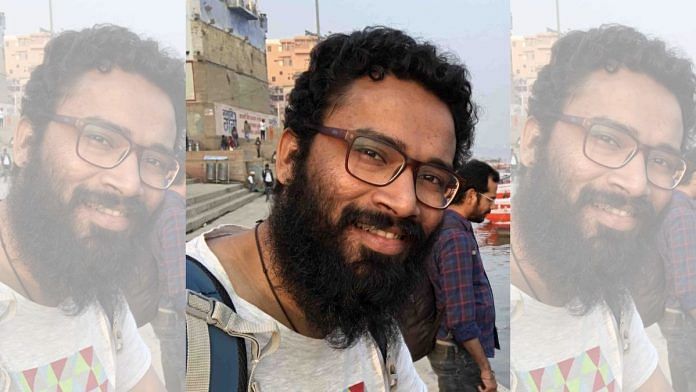
Thank you dear subscribers, we are overwhelmed with your response.
Your Turn is a unique section from ThePrint featuring points of view from its subscribers. If you are a subscriber, have a point of view, please send it to us. If not, do subscribe here: https://theprint.in/subscribe/
It is my considered opinion that Sriram Venkitaraman, IAS who is the main accused in the culpable homicide of journalist Muhammed Basheer in Kerala should resign from the Indian Administrative Services effective immediately.
Last week, Kerala government had appointed Mr. Venkitaraman to the post of the Collector of Alappuzha. Following statewide outrage, rallies and protests at a murder suspect appointed to a magisterial post, the government removed Venkitaraman from the Collector post. Kerala government has since reassigned him as the General Manager of Kerala State Civil Supplies Corporation.
However, Venkitaraman is unfit to serve in any administrative services posts. His conduct is unbecoming of an officer of the Indian Administrative Service. Most egregiously, he has broken law and order that he is duty-bound to uphold.
At 12:55 am on the night of August 3, 2019 an inebriated Venkitaraman returning from a party engaged in a high-speed drunk driving spree that resulted in crashing the vehicle after it ploughed into Basheer’s parked motorcycle from behind. The incident happened in the relatively affluent Museum neighbourhood in Thiruvananthapuram, a stone’s throw from the Museum police station. The deceased, Mr. Basheer was the bureau chief of Siraj Daily newspaper.
According to the charge sheet prepared by the investigative team under Crime Branch SP P. Shanavas, Venkitaraman is charged with the following crimes: IPC 303 for murder, IPC 201 (causing disappearance of evidence of the offence, giving false information to screen offender), IPC 185 (driving by drunken person), IPC 188 (punishment for offences under Motor Vehicle Act). Evidence includes five CCTV footages, nearly 100 witnesses, and 75 materials.
This case has not gone to trial. The honourable sessions court in Thiruvananthapuram has not passed a judgement acquitting or convicting Venkitaraman.
Why is the Kerala government paying an IAS officer a salary drawn from public revenue while he is the main accused in a culpable homicide/murder case?
Contrary to eyewitness testimony, Venkitaraman has claimed the following in his defence: that he was not driving the car and that his friend Wafa Firoz was behind the wheel; that he was not drunk though he refused a breathalyser test at the site of the incident; and, finally, that he suffers from “retrograde amnesia” that prevents him from recalling the incident.
The Indian Administrative Service does not have a Code of Ethics per se, but the *The All India Services Conduct Rules* ratified in 1968 covers many possible scenarios of unethical and non-professional conduct by civil service officers and their adjudication. For instance, Consumption of Alcohol and Drugs and its penalty are clearly discussed in great detail in this document.
Sriram Venkitaraman’s conduct since the accident which killed Muhammed Basheer has not been that of an innocent or lawful man. While at the site of a motor vehicle crash that killed a person, Venkitaraman did not take an alcohol breathalyser test as required by law. He admitted himself into a hospital of his choice. His alcohol test was done nine hours after the incident and only because of a public outcry.
Most egregiously, Venkitaraman, an IAS officer sworn to uphold law and order has publicly shown contempt for the Indian judicial system. Since February 2020, when the charge sheet was first filed in court, Venkitaraman evaded court summons from the Judicial First Class Court in Thiruvananthapuram multiple times to attend the court to have the charge sheet read. Following his noncompliance, the Judicial Court issued an ultimatum to Venkitaraman to appear before the court in September 2020 under IPC 209. Covid induced delays in 2020 notwithstanding, an IAS officer sworn to uphold law and order, and the #1 accused in a serious homicide/murder case cannot reject judicial summons to appear in court. These are not the actions of an innocent man, nor of a law-abiding IAS officer.
More unanswered questions exist in this case in the eyes of the public. Did the police interview the guests who attended Venkitaraman’s party the night of the incident? Did they examine the food and beverage list at the party? Why was the initial charge of IPC 304 – “culpable homicide not amounting to murder” — removed, and IPC 303 – “murder” — added? IPC 304 is the fact which can be proved. Why was it removed, and, “murder” where the burden of proof is very different, added?
Venkitaraman’s conduct has shown him to be a coward unfit to hold any Indian Administrative Service position. It is quite possible that he has committed perjury. An IAS officer who rejects judicial summons is not qualified to be an officer of law and order. Since this case has the potential to set a case law precedent in India, it is imperative that Venkitaraman be formally removed from his IAS career path, either voluntarily, or through official writ.
Gayatri Devi lives and works in the US.
These pieces are being published as they have been received – they have not been edited/fact-checked by ThePrint.

COMMENTS